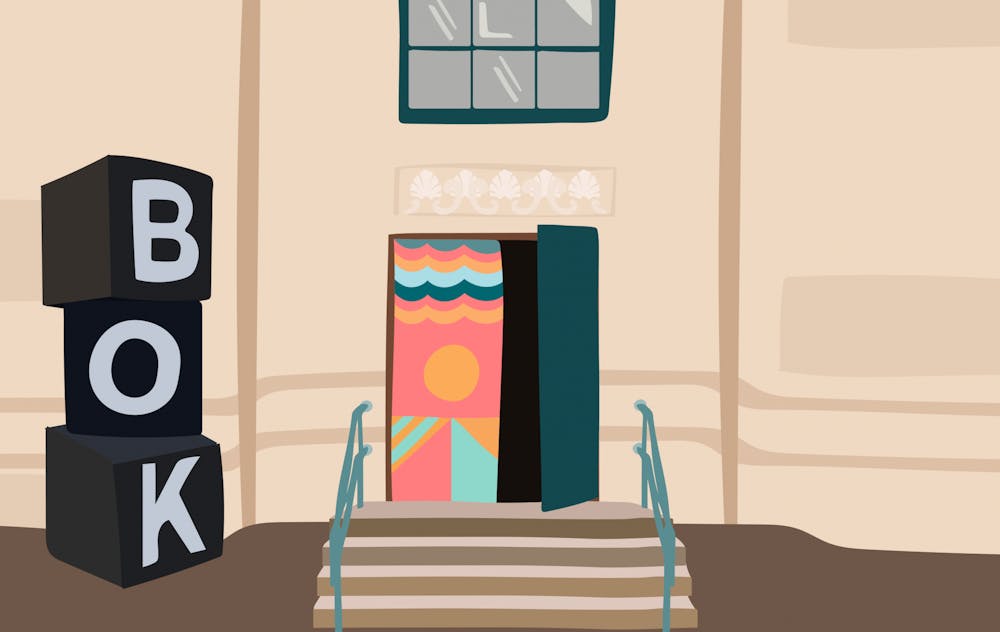Imposing cement walls line long stretches of South Philly’s Dudley and Mifflin streets, casting shadows over flocks of students from the neighboring elementary school making their ways home after the end–of–day bell and the occasional car rolling by on the adjacent roads.
The nearly century–old Bok Building appears unassuming to the average passerby. However, the Bok Building’s roots run deep in South Philly’s history. Built between 1935 and 1937, the Edward W. Bok Technical High School was funded by President Franklin Delano Roosevelt’s Public Works Administration. In 2013, the building was put up for auction by the city after being closed down due to funding inadequacies. By 2014, urban design and development practice Scout came across the sale of the nationally registered historic building and purchased the 340,000–square–foot former school for a total of $2.1 million. Scout successfully purchased the building with the intent to “reuse the existing infrastructure … to create affordable work space for a wide variety of different users.”
Eight years later, the development team has stayed true to its mission, and Bok has become a beacon of South Philly’s diverse entrepreneurial spirit. Seventy–one percent of its tenants are residents of South Philly, and 50 percent are businesses run by women.
After Scout’s purchase, the development practice has left the building’s historical charms untouched as it’s brought its mission of fostering entrepreneurship and community engagement to life. Scout had no plans to gut the decades–old structure, building ambassador Matthew Ober highlights, but rather intended to repurpose it for makers and creatives to utilize the former vocational education spaces. “Scout wasn’t going to change anything dramatically because it’s such an incredible historic building. [It’s] so well built and well designed,” says Ober.
The previously empty classrooms now house product showrooms and art studios where local makers, nonprofits, and small businesses can display their handiwork. The raw, industrial quality of Bok’s work spaces is a testament to the careful curatorial work that Scout has done to incorporate functional modern work spaces with the building’s vintage interior.
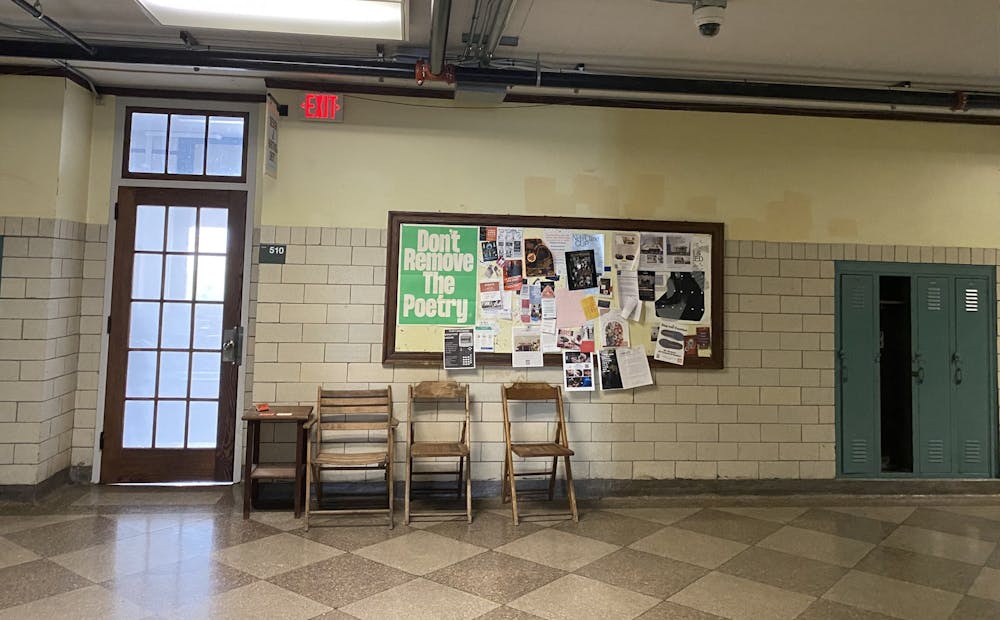
Scout is “doing just enough work to make spaces function, peel[ing] back the layers to [Bok’s] original state of beauty,” says Director of Leasing & Marketing, Liz Maillie. Synchronicity with the space is a key consideration when helping new tenants find their place in Bok’s ecosystem, she emphasizes. Her remark is in line with Bok’s goal of “match[ing] tenants with spaces that can accommodate their needs, while offering amenity and economic opportunity to the neighborhood.” Scout’s work to maintain the building’s interior rather than renovating it doesn’t just keep costs low—it transforms the building into a cohesive creative experience for both tenants and visitors alike.
An added benefit of the Bok Building’s low renovation costs is that management can provide more affordable spaces to first–time lessees. Scout remains deeply committed to minimizing barriers to entry for small businesses hoping to set up shop in Bok. “We’re not trying to be a gatekeeper,” says Maillie. Her words clearly reflect the building’s reality, as it’s practically at 100 percent capacity.
The Bok Building is more than just a relic of the 20th century—it’s currently home to over 250 businesses, artists, makers, entrepreneurs, and non-profits, including two rooftop restaurants, jewelers, videographers, artisan glassmakers, nonprofits, and even a bike repair shop. A miniature one–person jewelry business occupies an old faculty office, and a printmaking shop sits along old lockers. Standing amid the remnants of a once–abandoned school, the building is now a vibrant mecca of entrepreneurship.
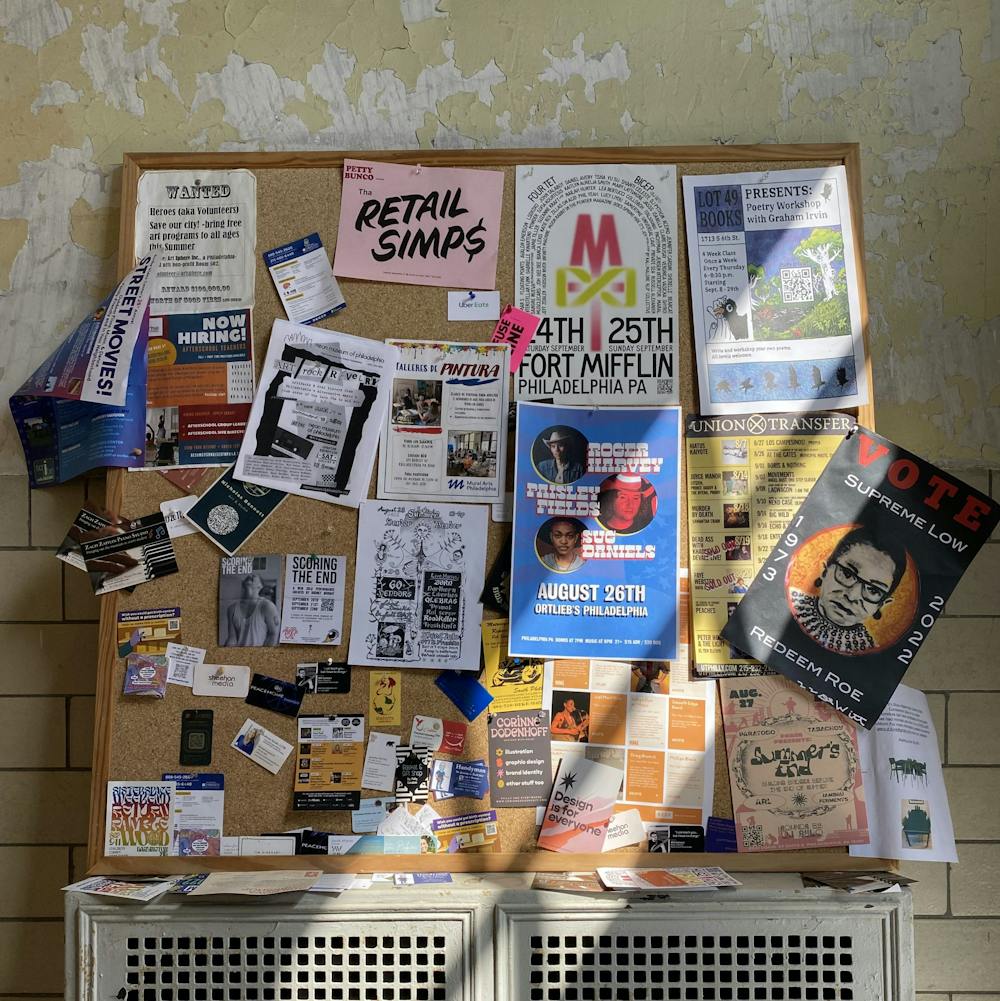
It’s a Tuesday evening, and the sun slips down the sides of Bok’s concrete exterior. The building’s Dudley Street entrance beckons with its warm wooden doors. A large corkboard in the entryway is flecked with sporadic art and announcements—some hailing events past due and some new. The space is at once industrial and inviting. Visitors have free access to the entry–level floor Thursday through Saturday and can take advantage of weekly tours offered every Wednesday at 5 p.m.
On weekends, the first–floor marketplace’s six storefronts come to life. Transport Cycles, an open–concept bicycle repair shop, spills into the marketplace in an exciting display of craftsmanship. Sitting opposite the aisle, baristas move fluidly around an espresso bar at Two Persons coffee shop, doling out delectable drinks and treats to guests navigating the crowded floor. Venturing farther into the building, visitors are greeted by Rider Ceramics’ storefront and workspace across from curated vintage clothing store Moore Vintage—both of which have mastered the balance between an intimate workspace and a vibrant storefront.

Looking at Transport Cycles and Two Persons coffee shop, two artisans on opposite ends of the business spectrum cohabiting the same space, it becomes clear that the harmonious juxtaposition between innovators makes Bok unique. The building is a far cry from a homogenous office space; it provides opportunities for cross–business collaboration and community engagement beyond Bok’s four walls.
Bok is more than a storefront experience. The upper floors are home to a diverse community of tenants who primarily operate as private businesses without storefronts for visitors. These work spaces are more varied in size and cost, a desirable quality for some who come to Bok and Scout to sign their first professional leases.
But to simply label Bok’s residents as tenants would be reductive. Bok embodies the intangible qualities that make its entrepreneurial spaces whole—collaboration, camaraderie, and authenticity. Whether businesses are looking for their first work space or hoping to expand their square footage, there’s a niche at Bok that will help them realize their goals.
“If someone needs a lot of power [because] they’re a woodworker, we’re finding a space in the western wing, because that’s where all the [school’s] workshops were previously, since there’s more power there than there is in the east wing,” says Maillie. “[Scout] is making sure that the space aligns with people’s needs.”
Remark Glass, one of Bok’s earliest and most innovative tenants, exemplifies Bok’s mission to connect makers with the spaces that they’ve only dreamed of. The business has mastered the art of creating aesthetic glassware without succumbing to the environmental harm often associated with the mass corporate production of glass goods. But Remark’s products are more than a fun, trendy addition to your home—they’re an amalgam of the pioneering and supportive spirit of Bok. Maillie echoes confidence in Remark’s mission, sharing, “[Remark] came to us early on [and] were already community–minded, creative, willing to take a chance on us, on this building.”
Founded in 2016, the company set up shop in a 1,300–square–foot work space after beginning its lease with Bok. The space more than doubled in size to 3,500 square feet in five short years due to Remark’s booming retail success and introduction of community outreach programs.
Surprisingly, Remark’s growth began spontaneously. After moving to Bok, the store’s co–founder Danielle Ruttenberg notes that fellow tenants would routinely drop off their used glass outside of Remark’s work space. Soon, word traveled throughout the building, and eventually, news of the innovative glassware store spread out the front door and into the neighborhood.
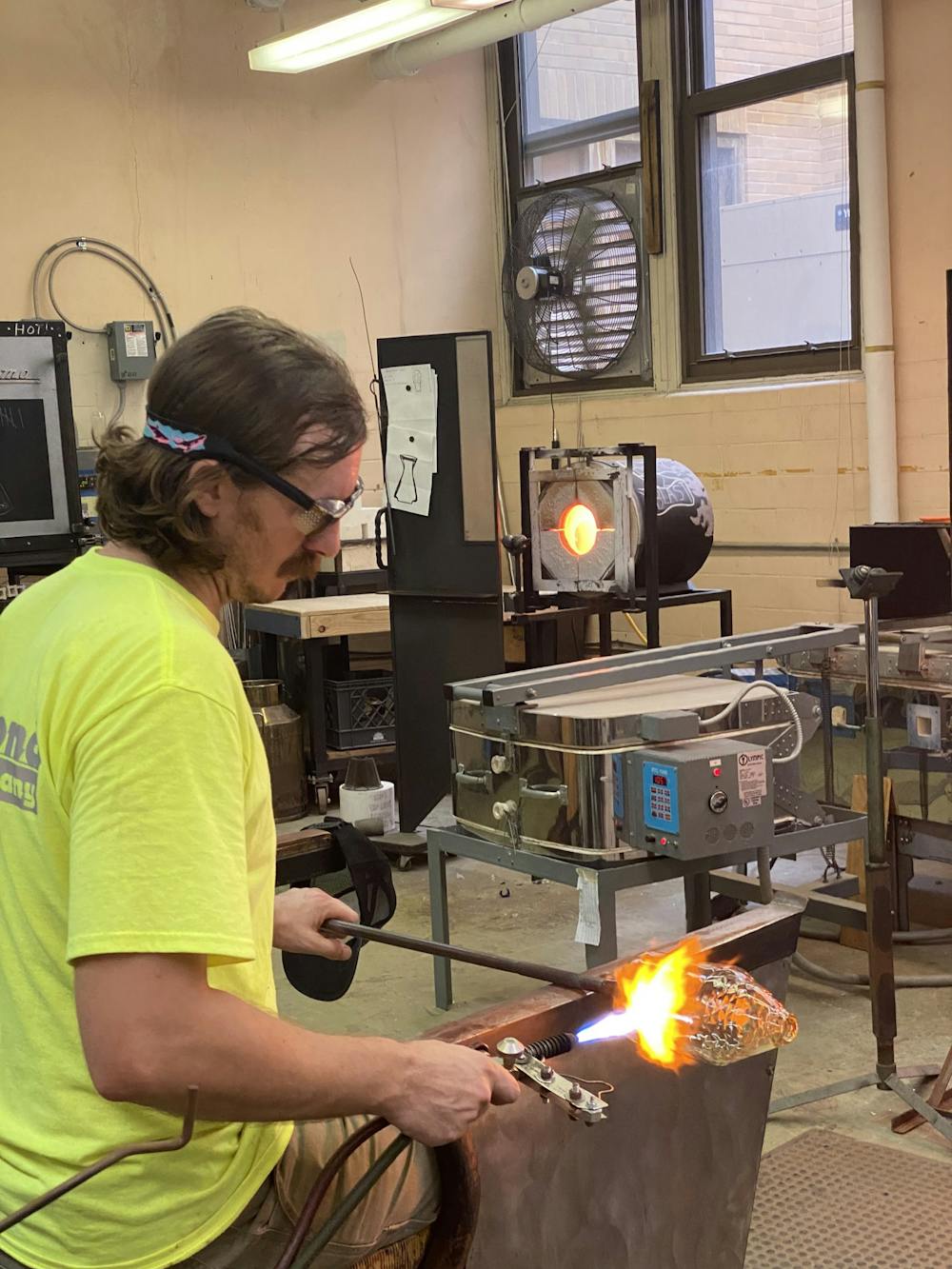
“Without marketing and without advertising, it [happened] all of the sudden,” says Ruttenberg. Capitalizing on its newfound popularity, Remark continued building momentum by developing community recycling initiatives, e–biking to local businesses outside Bok to collect glass and collecting from other Bok tenants. They soon formalized their donation intake process and, before they knew it, they were collecting glass from 10 to 15 businesses weekly.
In 2020, their success allowed them to branch out with their nonprofit sister organization, Bottle Underground. Touting a circular model, Bottle Underground is committed to collecting, cleaning, and sorting wasted glass material so that each piece of glass waste donated to them “is sent to its highest and best use.” Contrary to common belief, 70 percent of post–consumer glass that gets recycled by users actually ends up in landfills. The nonprofit aims to refurbish glass through “recirculation, recycling, downcycling and upcycling with the goal of reducing glass waste on a local level.”
Ruttenberg reveals that their current downcycling project hopes to create a soilless “soil” blend that can counteract flooding and provide drainage after storms. With the support of a Small Business Innovation Research grant from the Environmental Protection Agency, Bottle Underground is evolving as quickly as Remark Glass.
Today, Remark and Bottle Underground lay claim to the majority of Bok’s basement. The expanded space enables them to fulfill their booming online sales, maximize the community impact of their nonprofit division, and continue to provide their retail storefront to visitors. The flexibility of Bok’s unique work spaces supported Remark Glass’ transition when its business grew beyond their former space. Remark’s success paints a clear picture of how the building provides entrepreneurs, artists, and community organizers with upward and outward mobility to expand their reach.
Without Bok’s collaborative community, Remark’s operations would be drastically different, and the local ecosystem would be worse off without its proactive recycling initiatives. For Remark, the help of fellow tenants is what brings its mission to life. Maillie says, “We’re building way more than the space, we’re fostering a supportive community.”
Just like Remark, Pablo Alarcón Jr.’s personal and professional story exemplifies how Bok’s unique entrepreneurial community allows its tenants to thrive. As a design associate for BlackStar Projects, Alarcón offers personal insight into the company’s mission to uplift and platform BIPOC artists. Its Many Lumens podcast and an annual BlackStar Film Festival celebrate experimental work from Black, Brown, and Indigenous artists inspired by the African diaspora and global Indigenous communities.
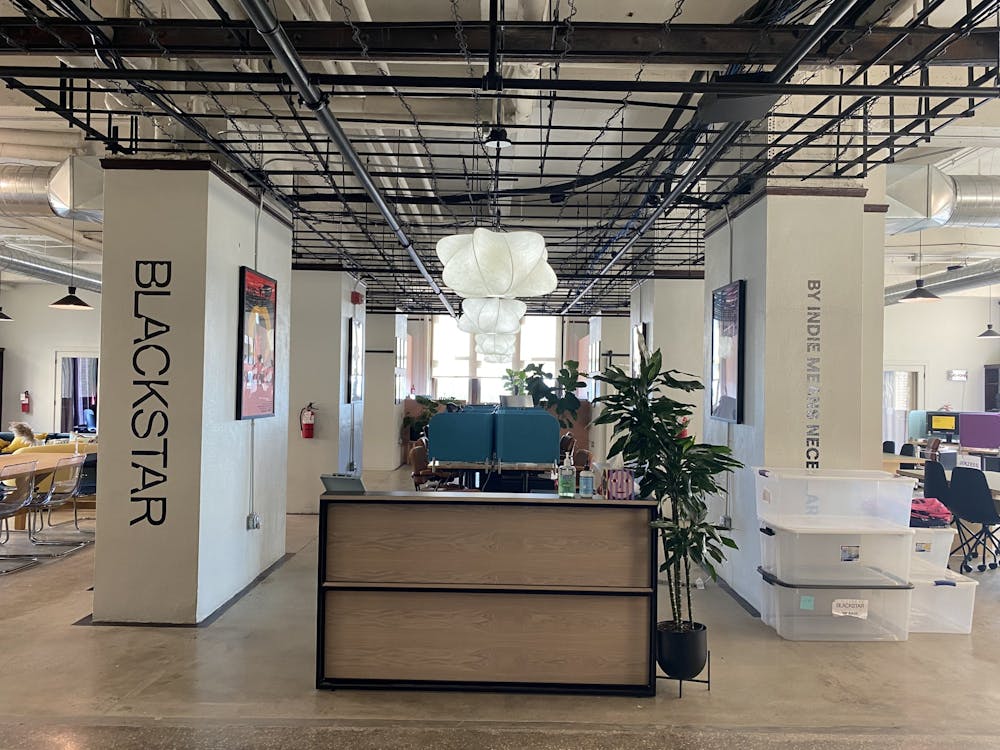
Alarcón was first introduced to BlackStar Projects while working just a few floors above as a screen printer and marketing assistant for Philadelphia Printworks (PPW), another social justice–oriented Bok resident creating accessible apparel for activists, organizers, and allies.
As a screen printer at PPW, Alarcón was introduced to BlackStar through a merchandise collaboration between the two companies. He quickly fell in love with the BlackStar family—eventually embarking on a new artistic career path with the organization without ever having to leave the building. “It’s a predominantly POC and queer space, and it’s such an amazing experience being here,” Alarcón says.
He jokingly reminisces about his transition, calling himself “a jack of all trades, but master of none.” In reality, his vast set of creative skills and the collaborative nature of the Bok community allowed him to make the leap between businesses. Alarcón’s current design work is rooted in the same values he held while working at Philadelphia Printworks—a mission to organize entrepreneurship around a social justice framework.
Showcasing films from around the globe, BlackStar’s 2022 Film Festival was as imaginative as it was diverse. Featuring work from BIPOC creatives leading the fight for minority representation in film, Alarcón was both inspired and moved by the event. The festival’s screenings and discussions sparked emotion, Alarcón says, “I felt like I could see bits and pieces of me in every film.”
For BlackStar, business is never a static nor solitary act. Individuals and companies alike are frequently evolving and adapting to the needs of its employees, fellows, and audiences. Sitting in the heart of South Philadelphia, the company also engages with the community that surrounds it through exhibitions, seminars, and filmmaking courses.
BlackStar takes pride in its mission to center its work, whether creative or entrepreneurial, around joy and community–building efforts—a sentiment that rings true for many others in the Bok Building.
BlackStar isn’t the only Bok business whose ethos has been shaped by the people that surround it. Historically inhabited by immigrant communities, the Bok Building is currently nestled in the largest population of Latino immigrants in Philadelphia. Bok attempts to acknowledge the importance of this history through back–to–school drives, an alumni day for the building’s former vocational students, and neighborhood block parties.
In this vein, the Garces Foundation, located on the second floor, aims to provide local support through four primary channels: English language instruction, community health days providing free dental and medical services, dental programming with a partner clinic, and resources addressing "the acute, changing needs of our community."
Garces Foundation’s Director of Programs Jillian Gierke understands firsthand the power of a holistic approach. The program is designed to help immigrants “meet their professional and personal goals [while] providing for their families,” says Gierke. “The Garces Foundation was founded to [ensure] that the immigrant community has access to the resources they deserve to live healthy, educated, nutritious lives.”
Gierke beams when mentioning a recent Garces Foundation student who passed all four subjects of the GED and walked in the citywide graduation. Gierke acknowledges that “it [was] a pretty intense path” for the young scholar, who had already studied to be a dentist in the Dominican Republic before coming to Philadelphia. She now aspires to continue working in dentistry here in the United States—an undertaking that Gierke believes the Garces Foundation’s tutelage has prepared her for.
From early on, the Bok Building was integral to helping the Garces Foundation realize its own ambitions given its geographic location. “As soon as we knew about Bok, it became evident that [the building] would be a space for community organizations—we certainly share the vision for providing spaces for all kinds of nonprofits, businesses, and artists,” says Gierke.
Speaking to the essence of Bok’s vibrant character, Liz Maillie says, “It’s a very atypical, nontraditional building—it has its quirks, which most folks love.”
At Bok, a renowned bakery run by a chef–turned–baker can set roots, and an artisan rug curator can pay tribute to her family trips to Syria. A recording studio, a catering company, a dog daycare, and global nonprofits have similarly found a home in Bok’s historic halls. This creative collective is an homage to the rich history of South Philly’s tradespeople, and, according to Maillie, it’s become “a vibrant space with a lot of diversity in terms of offerings.”
For lessees who came to Bok as small businesses, “it can be scary to sign a commercial lease because they’re long,” Maillie says. “So we really try to make the building feel approachable—to make the process feel [more] accessible.”
Taking on a property like Bok is no small feat, but Scout has managed to find harmony among its tenants, who are a microcosm of Philly’s innovative talent. According to Maillie, the building strives to be “a platform for helping business owners realize what they want in a space, while promoting and supporting their work.”
At every turn, the Bok Building subverts expectations, successfully remaining a doorway into the past while providing a space for businesses to shape their creative futures.
